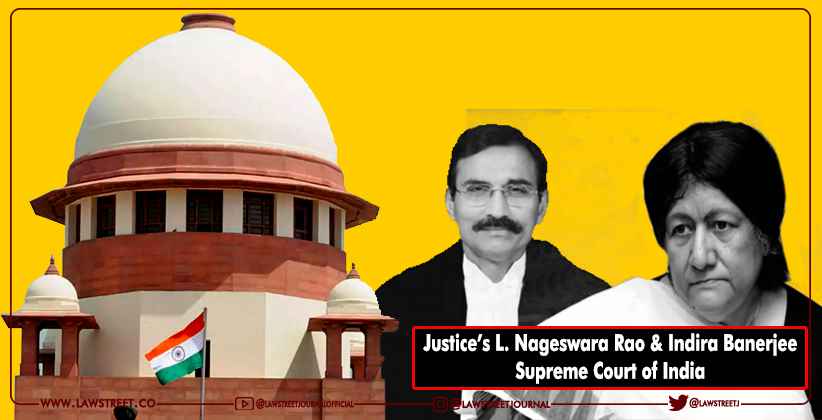In Medical Council Of India v. Anchal Parihar & Ors., the Supreme Court on Tuesday (February 2, 2021) held that migration cannot be permitted from an unrecognised medical college to a recognised medical college in view of Regulation 6 of the Medical Council of India Regulations on Graduate Medical Education, 1997.
The two judge bench of Justice L. Nageswara Rao and Justice Indira Banerjee Were hearing the challenged Rajasthan High Court judgment by Medical Council Of India (MCI). The learned Single Judge of the High Court allowed the Writ Petition and directed the Medical Council of India to relax the Regulations and permit migration of respondent holding that the term 'Migration' referred to in sub-clause (2) of Regulation 6 of the Migration Rules is not limited to Schedule-I of the Medical Council of India Act, 1956 and has much wider scope.
The top court observed that the High Court hax committed an error in interpreting Regulation 6 of Graduate Medical Education Regulations, 1997.
Migration of a student pursuing an undergraduate medical course is permissible only if both the colleges are recognised by the Central Government under section 11(2) of the Indian Medical Council Act, 1956 in accordance with Regulation 6(2). The further condition stipulated in Regulation 6(3) is that an application for migration may be made by a candidate only after qualifying the first professional MBBS examination. Migration during clinical course of study shall not be allowed on any ground, the top court said.
FACTS OF THE CASE:
Respondent No. 1 was admitted to first MBBS Course in Ananta Institute of Medical Sciences & Research Centre, Rajsamand, who requested the Board of Governors (in supersession of MCI) to permit migration to Dr. S. N. Medical College, Jodhpur by a letter dated 26.08.2019. She relied upon the certificates issued by Ananta Institute of Medical Sciences & Research Centre, Rajsamand and the Principal of Dr. S. N. Medical College Jodhpur whereby they gave no objection for the migration.
However, the Board of Governors in supersession of Medical Council of India rejected the request for migration by a proceeding dated 25.10.2019 on the ground that it is not permissible under clause 6(2) of the Migration Rules.
The proceeding dated 25.10.2019 was communicated to the first respondent by the Director of Medical Education on 07.11.2019. 3. Respondent no.1 filed a Writ Petition in the High court of Judicature for Rajasthan at Jodhpur challenging the validity of the proceeding dated 25.10.2019 and seeking a direction to the respondent to permit a transfer from Ananta Institute to Dr. SN Medical College, Jodhpur.
By a Judgment dated 09.01.2020, the learned Single Judge of the High Court allowed the Writ Petition and directed the Medical Council of India to relax the Regulations and permit migration of respondent no. 1.
The appeal filed by the Medical Council of India was dismissed by a Division Bench of the High Court. On behalf of the appellant, Advocate Gaurav Sharma contended that the High Court has committed an error in interpreting Regulation 6 of Graduate Medical Education Regulations, 1997, according to which,
- Migration of a student pursuing an undergraduate medical course is permissible only if both the colleges are recognised by the Central Government under section 11(2) of the Indian Medical Council Act, 1956 in accordance with Regulation 6(2).
- The further condition stipulated in Regulation 6(3) is that an application for migration may be made by a candidate only after qualifying the first professional MBBS examination. Migration during clinical course of study shall not be allowed on any ground.
It was argued on behalf of the appellant by Mr. Sharma that migration is not permitted by the Medical Council of India from a private college to the government college. He submitted that the first respondent belonging to OBC category was placed at 6,73,898 rank in the merit list as she secured only 110 marks out of total 720 marks in the NEET (UG)-2018 examination. Whereas, the cut off for admission in respect of OBC category in Dr. S. N. Medical College Jodhpur which is a Government Medical College to which the Respondent no. 1 sought migration is 560 marks out of 720 marks. It was further submitted on behalf of the appellant that the first respondent is in the 2nd MBBS (3rd year) and the clinical courses have already commenced.
Mr. Atul Jha, learned counsel for the first respondent referred to the Regulations to submit that Medical Council of India has the power to relax. He submitted that the decision not to grant permission for migration is discriminatory.
He also submitted that the father of the first respondent is suffering from cancer and the migration sought by the first respondent should be considered on humanitarian ground.
CONCLUSION:
The top court thus observed that the interpretation of the Regulation 6(2) by the High Court is patently erroneous. Regulation 6(2) provides that migration is permissible only if both the Colleges are recognised u/s 11(2) of the Indian Medical Council Act, 1956.
Admittedly, the college in which the first respondent is studying is yet to be recognised u/s 11(2) of the Act. Migration cannot be permitted contrary to the Regulations, the bench observed.






